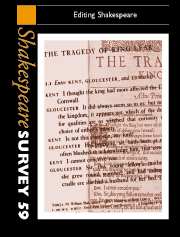Book contents
- Frontmatter
- Editing Shakespeare’s Plays in the Twentieth Century
- Crisis in Editing?
- On Being a General Editor
- Altering the Letter of Twelfth Night: ‘Some are born great’ and the Missing Signature
- ‘A Thousand Shylocks’: Orson Welles and The Merchant of Venice
- The Date and Authorship of Hand D’s Contribution to Sir Thomas More: Evidence from ‘Literature Online’
- Ferdinand’s Wife and Prospero’s Wise
- Editing Stefano’s Book
- Manuscript, Print and the Authentic Shakespeare: The Ireland Forgeries Again
- The Author, the Editor and the Translator: William Shakespeare, Alexander Chalmers and Sándor Petofi or the Nature of a Romantic Edition
- Women Edit Shakespeare
- The Shakespeare Edition in Industrial Capitalism
- Print and Electronic Editions Inspired by the New Variorum Hamlet Project
- The Evolution of Online Editing: Where Will it End?
- The Director as Shakespeare Editor
- The Editor as Translator
- Performance Editions, Editing and Editors
- Editing Collaborative Drama
- Will in the Universe: Shakespeare’s Sonnets, Plato’s Symposium, Alchemy and Renaissance Neoplatonism
- Giants and Enemies of God: The Relationship between Caliban and Prospero from the Perspective of Insular Literary Tradition
- Shakespeare’s Ages
- Who Wrote William Basse’s ‘Elegy on Shakespeare’?: Rediscovering a Poem Lost from the Donne Canon
- ‘Sometime a Paradox’: Shakespeare, Diderot and the Problem of Character
- Shakespeare Performances in England, 2005
- Professional Shakespeare Productions in the British Isles, January–December 2004
- The Year's Contributions to Shakespearian Study 1 Critical Studies
- 2 Shakespeare in Performance
- 3 Editions and Textual Studies
- Index
Shakespeare Performances in England, 2005
Published online by Cambridge University Press: 28 March 2007
- Frontmatter
- Editing Shakespeare’s Plays in the Twentieth Century
- Crisis in Editing?
- On Being a General Editor
- Altering the Letter of Twelfth Night: ‘Some are born great’ and the Missing Signature
- ‘A Thousand Shylocks’: Orson Welles and The Merchant of Venice
- The Date and Authorship of Hand D’s Contribution to Sir Thomas More: Evidence from ‘Literature Online’
- Ferdinand’s Wife and Prospero’s Wise
- Editing Stefano’s Book
- Manuscript, Print and the Authentic Shakespeare: The Ireland Forgeries Again
- The Author, the Editor and the Translator: William Shakespeare, Alexander Chalmers and Sándor Petofi or the Nature of a Romantic Edition
- Women Edit Shakespeare
- The Shakespeare Edition in Industrial Capitalism
- Print and Electronic Editions Inspired by the New Variorum Hamlet Project
- The Evolution of Online Editing: Where Will it End?
- The Director as Shakespeare Editor
- The Editor as Translator
- Performance Editions, Editing and Editors
- Editing Collaborative Drama
- Will in the Universe: Shakespeare’s Sonnets, Plato’s Symposium, Alchemy and Renaissance Neoplatonism
- Giants and Enemies of God: The Relationship between Caliban and Prospero from the Perspective of Insular Literary Tradition
- Shakespeare’s Ages
- Who Wrote William Basse’s ‘Elegy on Shakespeare’?: Rediscovering a Poem Lost from the Donne Canon
- ‘Sometime a Paradox’: Shakespeare, Diderot and the Problem of Character
- Shakespeare Performances in England, 2005
- Professional Shakespeare Productions in the British Isles, January–December 2004
- The Year's Contributions to Shakespearian Study 1 Critical Studies
- 2 Shakespeare in Performance
- 3 Editions and Textual Studies
- Index
Summary
The last instalment of this chronicle of Shakespeare’s fortunes on the contemporary English stage closed with the pious hope that the RSC’s projected 2005 main-house season of four comedies, the sequel to 2004’s uneven batch of tragedies, might restore the company’s sometime reputation as an organization committed above all to exploring the canon’s continuing relevance to and engagement with contemporary society. This hope, alas, was doomed to disappointment: apart from a very flamboyant and inventive A Midsummer Night’s Dream, directed by Gregory Doran as if to provide a reckless and affectionate farewell party for the cavernous interior of the Royal Shakespeare Theatre, ‘The Comedies’ produced little that might not have appeared there just as readily at any time over the last two or even three decades, and the company’s collective mind in any case seemed already to have moved on to a larger project before the 2005 season had even opened. Between April 2006 and April 2007 the RSC, at first taking advantage of the simultaneous existence of both the RST as it is and the temporary Courtyard Theatre erected in the Other Place car park to replace it while its interior is completely rebuilt, and throughout deploying the Swan and a range of newly co-opted venues around Stratford (including Holy Trinity Church), will either stage or host productions of every single one of the Complete Works. The artistic reasons behind this massive undertaking have yet to be explained – the strenuous publicity so far (‘The Greatest Dramatist – The Essential Year’) suggests something between the spirit of the Guinness Book of World Records and whatever it is that motivates those cloying continuous marathon chronological play-throughs of the entire Bach canon mounted by North American campus radio stations – and the economics remain puzzling too.
- Type
- Chapter
- Information
- Shakespeare Survey , pp. 298 - 337Publisher: Cambridge University PressPrint publication year: 2006

